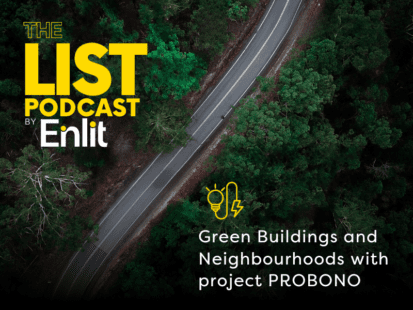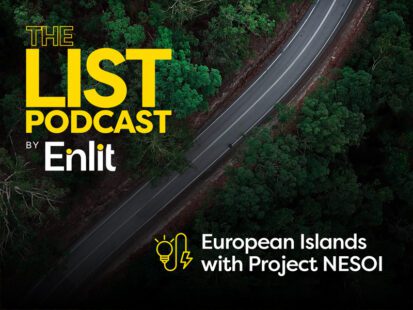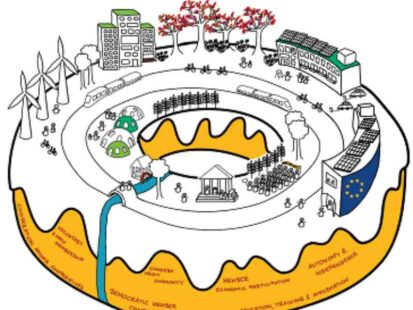
Our built environment has a significant impact on the energy transition and sustainability goals, with buildings accounting for a substantial portion of the EU’s energy consumption and carbon emissions.
In this episode of The List Podcast, Areti delves into the world of green buildings and neighborhoods with the PROBONO project, exploring the challenges and opportunities presented by this crucial transition.
The urgency for greener buildings
The statistics are stark: buildings in the EU are responsible for 36% of greenhouse gas emissions and 42% of its energy consumption. Recognising this urgency, the European Commission has implemented new regulations mandating all new buildings to achieve zero-emission status by 2030, with public buildings leading the way by reaching this target even sooner in 2027. Additionally, the revised Energy Performance of Buildings Directive sets minimum efficiency standards, aiming to accelerate the renovation of buildings that fall short of these benchmarks.
Beyond the headlines: Challenges on the road to green
While the direction is clear, the path towards widespread green building adoption is not without its hurdles. One significant obstacle lies in the upfront costs associated with implementing sustainable technologies and meeting stringent efficiency standards. This can be a barrier for many developers and homeowners, particularly those in low-income communities.
Beyond financial constraints, ingrained habits and resistance to change can also impede progress. Shifting mindsets and encouraging stakeholders accustomed to traditional methods to embrace innovative solutions requires dedicated advocacy and education efforts.
Furthermore, retrofitting existing structures to comply with zero-emission targets presents complex logistical and operational challenges. Coordinating renovation projects across diverse urban landscapes while minimizing disruption for occupants demands meticulous planning and organization.
Project PROBONO: A vision of sustainable communities
To understand the complexities and potential of green building initiatives, Areti interviews Gerhard Stryi-Hipp, a representative from the EU-funded project PROBONO. PROBONO paints a compelling vision of the positive impact that green buildings and neighborhoods can have on our environment and society.
The project emphasises the importance of efficient planning, technology integration, and the utilisation of renewable energy sources like solar and geothermal. By adopting these strategies, PROBONO envisions a future with significantly reduced energy consumption and carbon emissions, leading to a healthier planet. Additionally, the project highlights the role of green spaces within neighborhoods, promoting physical activity, mental well-being, and fostering stronger, more resilient communities.
Taming the challenges: Digital twins as a game changer
Despite the promising vision, Gerhard acknowledges the significant challenges PROBONO encountered during its pilot projects. He emphasises the importance of addressing affordability, ensuring social acceptance of new technologies and infrastructure changes, and effectively integrating digital solutions with existing systems.
One innovative approach championed by PROBONO is the use of digital twins. This technology creates a virtual replica of the neighborhood, allowing experts to simulate and analyze various scenarios, such as construction methods, energy use, mobility patterns, and social dynamics.
Digital twins serve as a valuable tool for planning and optimizing green communities. They enable testing and refining solutions before implementation, ensuring the final built environment addresses diverse needs and challenges. Furthermore, these digital replicas can be used beyond the initial planning phase, facilitating ongoing monitoring, optimization of processes, and community engagement.
Collaboration and public support: Paving the way forward
PROBONO recognizes that achieving widespread green building adoption necessitates a collaborative effort. By supporting living labs, analysing their findings, and developing certification schemes, the project aims to create a roadmap for successful implementation.
However, public support is equally crucial. Areti and Gerhard discuss the need for public bodies to play a key role, not only in coordinating and financing these initiatives but also in ensuring their accessibility and long-term success.
A nuanced approach for sustainable communities
The transition towards greener buildings and neighborhoods demands a multifaceted approach. Balancing environmental benefits with affordability, social acceptance, and technological integration is essential for creating sustainable and thriving communities for generations to come.
The work of PROBONO and countless other initiatives across the EU demonstrates that this transition, while complex, is achievable through collaboration, knowledge sharing, and unwavering commitment to building a greener future.
Ready to learn more? Visit the Enlit Europe Projects Zone to discover more about PROBONO and other pioneering projects driving the energy transition forward.



